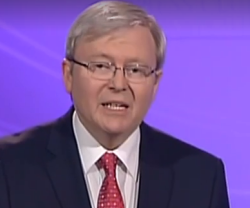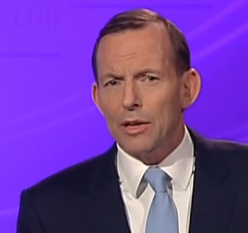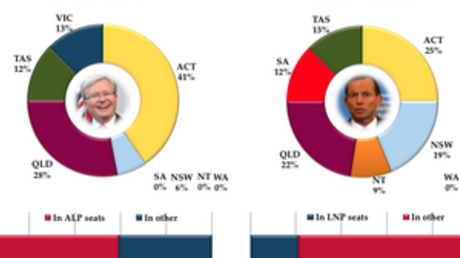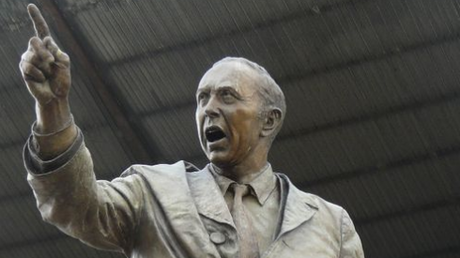

A GOOD debate usually has three things. One, speakers that are responsive to each other and the questions asked of them. Two, careful discussion of the issues in the debate that compares the two competing visions being put forward. Three, a way of speaking that draws in the audience and demands their respect.
Unfortunately, last night's debate between Kevin Rudd and Tony Abbott failed on all three counts. Both speakers were evasive, mechanical and unable to substantiate their positions beyond buzzwords and slogans from campaign booklets. In this debate, the real loser was the Australian viewing public. Not only were they denied meaningful discussion about future governance, they were also subjected to an hour of excruciatingly boring television. Here’s how things could have been better.
Not only were they [Australians] denied meaningful discussion about future governance, they were also subjected to an hour of excruciatingly boring television
Debating Lesson #1.
Listen carefully to what your opponent is saying and respond to it. In order for a proper debate to occur, there has to be a ‘clash’ between the ideas that are being presented by either side. The leaders' debate sometimes failed to deliver on this front, and what distinguished the speakers and their respective policies remained unclear. Mr Rudd and Mr Abbott often sought to defeat each other’s claims not by directly engaging with them, but rather responding with more accusations.
Early on, Mr Rudd branded Mr Abbott a ‘slash and burn’ leader who would embrace cuts to the public service to balance the budget. Mr Abbott’s first response was to point to declines in healthcare funding that had occurred under the current government, rather than actually address Mr Rudd’s charge. While this may have deflected the PM’s attack, it still left a significant question of policy unanswered. This way of arguing by ‘straw man’ continued throughout.
Equally, the debate suffered when Mr Abbott and Mr Rudd were unwilling to admit that there was little difference between them in regard to certain policy areas. On the topic of aged care, both leaders struggled to hide their bipartisan support for reform, and instead used the elderly as a vehicle to discuss a questionable imperative (an overabundance of paper in the system) and largely unrelated broadband and industrial relations policies. A more strategic debater would have acknowledged the existing consensus, and move on to points of greater clash.
Debating Lesson #2.
It’s not okay to ignore questions that you may find difficult. When it came to the tricky questions, both Mr Rudd and Mr Abbott came up short. In debating, recognising flaws that exist in a policy and then pre-empting criticism minimises the harm that can be done to your case. There exists no such thing as a perfect argument and to pretend so only acts to weaken a speaker’s credibility.
This lesson was illustrated when the leaders were quizzed on potential spending cuts that would have to be made in Australia’s future, given forecasts for declining government revenue. The Prime Minister ignored the premise of the question, presenting a long winded response encompassing company tax, the current budget outlook and infrastructure investment. Even after being pushed to respond again by the moderator, Mr Rudd didn’t deliver a straightforward answer - an approach that was neither persuasive nor reassuring to the audience.
Mr Abbott adopted a different, although similarly ineffective, approach to tough questions. On the issue of marriage equality, he began to construct what he says is his compassionate understanding of the issue by acknowledging his sister, a lesbian, in the audience. This approach was weakened by his next statement, that the issue was not a priority. The opposition leader’s tactic of trying to personalise the issue, but then avoid defending the position he has taken against Mr Rudd’s criticism had the potential to paint him as confused, or even callous. At points in the debate, both leaders could have benefited from making strategic concessions that painted a more realistic picture of what they stood for.
The leaders' debate, done properly, has the potential to illuminate meaningful differences between candidates and empower voters through better engagement in the political process
Debating Lesson #3.
Language, tone and body language can be powerful tools of persuasion. What is said in a debate is often not as important as how it is said. The ability to convince an audience often relies on the image the speaker conveys as an argument is made. In this regard, Mr Rudd was significantly weaker than Abbott. The Prime Minister’s manner of speaking at times seemed controlling, and slightly condescending to the moderator. While this could communicate a level of confidence, it risked turning off an audience who did not wish to be lectured to. This was compounded by Mr Rudd’s tendency to generate two to three sentences of preamble before providing a more direct response.
Mr Abbott, in comparison, was effective in maintaining a calm demeanour while also honing in on Mr Rudd’s failings in presentation, offering direct one line responses to what he termed Mr Rudd’s “waffle”. That said, at times both leaders employed highly meaningless turns of phrase, including “That is a much broader equation for all Australians” (Mr Rudd) and the highly managerial “Cost of living pressures [faced] in supporting their families" (Mr Abbott). In a debate where the ability to respond on issues is very limited, there is a high opportunity cost to such poor use of language. Not only that, it makes the debate a much less engaging one.
Many of these criticisms are the result of Mr Rudd and Mr Abbott playing it safe in the debate. Gaffes in election debates have the potential to make underdogs frontrunners, so cautious performances which minimise the risk of embarrassment are seen as the right course of action. But the leaders' debate, done properly, has the potential to illuminate meaningful differences between candidates and empower voters through better engagement in the political process.
It’s a risk well worth taking.




